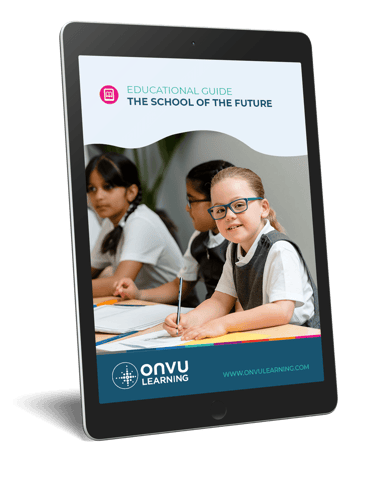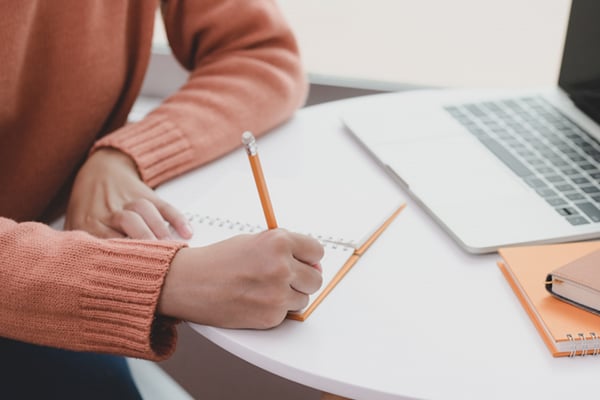- Blogs
- 3 Minute Read



This bonus blog of the self-reflection series looks at the ways to start or improve self-reflection while remote teaching. We’ve been writing about the importance and value of self-reflection for teachers for a few weeks. Mark Enser’s timely article in the TES reinforces this – as he describes the importance of reflection as well as experience in his own practice.
However, with the current pandemic lockdown, teachers have switched from face-to-face teaching to online support – whether by delivering online lessons, setting work, or suggesting a range of activities alongside pastoral care.
Where does reflection sit within this space? Well, when you’re doing something totally new and the colleagues you might have turned to for advice are in the same position, reflection is perhaps even more important to put your work into a wider context and ensure that you focus on what really matters.
Here are some suggestions on how you could try ‘remote reflection’ and make it work during these times.
It’s easy to just try to replicate what you do in class, but think carefully about why you are setting work. Are you looking to practice and embed already taught skills, to keep students engaged with learning or to teach them new ideas for external examinations? And how will you know if you are achieving these?
There are a host of sites now that offer free content (the UK’s Department for Education has a list here) or a plan for the day (including Oak National Academy and BBC Bitesize for children over 5 and EYFShome for those 3-5). Writing everything from scratch at this time will leave little time for reflection.
Schools at this time have widely different systems which allow feedback, but the easiest tool is a quick quiz, to check understanding. Google Forms lets you create simple surveys, or if you have a live lesson you can use the increasingly popular Kahoot!
In the classroom you can ‘feel’ how students are responding to your work. But when you’re setting work remotely you have no idea if you’re setting too much, or if is too easy. Let pupils and their parents know that you welcome feedback on time taken and difficulty level.
This is certainly not a suggestion that schools should be trying to replicate lesson observations and ‘learning walks’, but that a second pair of eyes works extremely well in difficult conditions. Keep feedback positive and constructive – it really helps to know if students can’t access the work or if something vital is missing.
Some teachers (believe it or not!) actually enjoy the experience of online teaching (especially those who have done it before or have strong technological experience) while others will find it very difficult. See if the process explained in our last blog might help.
It may seem that lockdowns have been in place for ever and remote teaching is the new normal, but most students will only lose a few weeks of learning and we will all be back in classes soon. But what will you have learned that will help you in future? Will you keep using tools like Microsoft Teams or Google Classroom to share or accept assignments? Can you record and store key lessons so students can watch them later?
We hope this blog has inspired you to go on and spend some time on this incredible discovery journey that self-reflection can be. We’d love to hear what you have to say on the topic – share your experience and tips with the teaching community on Twitter and LinkedIn.
The complete self-reflection series:
Self-Reflection (Part 1): Introduction: Could ‘noticing’ and ‘reflection’ transform teaching?
Self-Reflection (Part 2): 8 Ways to reflect on a lesson and share your reflections
Self-Reflection (Bonus blog): 7 Ideas for remote reflection in teaching
Self-Reflection (Part 3): Creating a wider culture of self-reflection in your school
Self-Reflection (Part 4): How schools have enabled self-reflection and noticing
Self-Reflection (Part 5): Using ONVU Learning's Reflect tool to implement self-reflection
Please subscribe to our newsletter to keep up to date with the latest blog series on lesson observation, teacher development and remote coaching.

The School of the Future Guide is aimed at helping school leaders and teachers make informed choices when designing the learning environments of the future using existing and upcoming technologies, as they seek to prepare children for the rest of the 21st century – the result is a more efficient and competitive school.
KEEP IN TOUCH WITH ONVU LEARNING AND RECEIVE THE LATEST NEWS ON EDTECH, LESSON OBSERVATION, AND TEACHER TRAINING AND DEVELOPMENT.